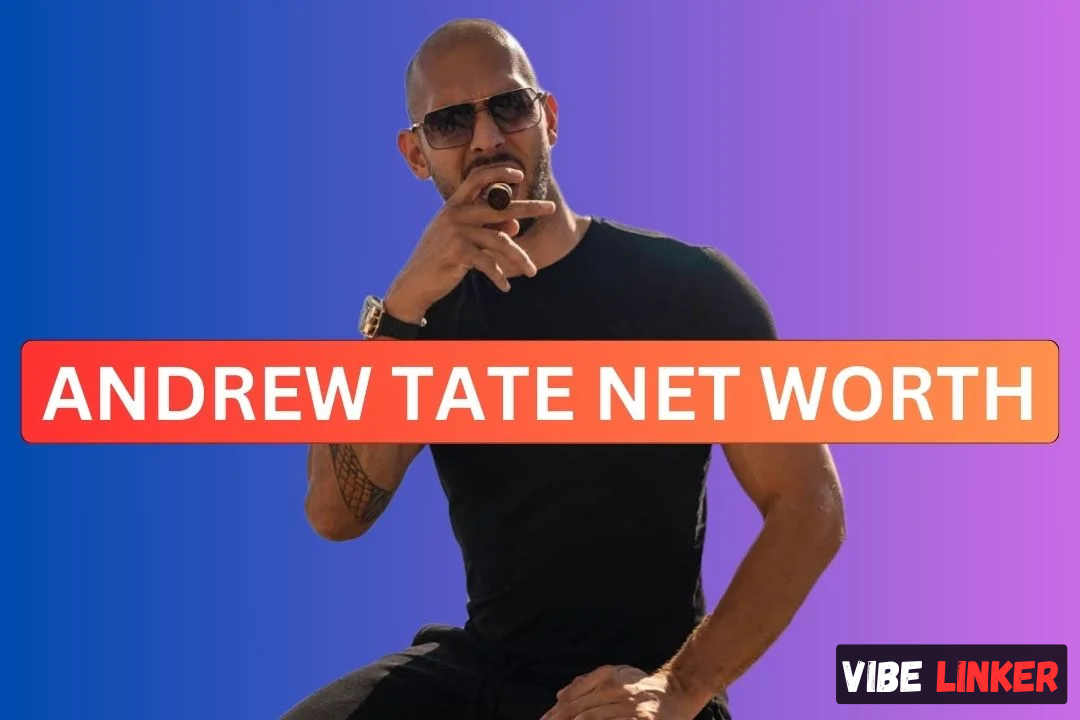
Introduction
Andrew Tate Net Worth is a name that triggers diverse reactions across the globe. A former kickboxing champion turned internet personality and entrepreneur, Tate has cultivated a polarizing presence in the public eye. To his supporters, he represents unapologetic masculinity, financial independence, and freedom from societal norms. To his critics, he embodies controversy, arrogance, and a brand of extremism that often sparks public debate. Regardless of opinion, one thing is certain—Andrew Tate has amassed substantial wealth, and understanding his net worth requires looking deeper into his business ventures, investments, public statements, and the digital empire he claims to rule over. His wealth is not just a number; it is a reflection of how new-age influencers can manipulate media, lifestyle, and branding to generate vast sums of money.
The Transition from Sports to Business
Andrew Tate Net Worth rise to prominence did not begin in the world of entrepreneurship or online influence. He first gained recognition as a professional kickboxer, winning multiple championships and achieving status within the sport. While combat sports seldom lead to lasting wealth unless leveraged properly, Tate treated his athletic background as a stepping stone. After retiring from competition, he leveraged his reputation to build visibility and credibility in other industries. His transition into business began with small ventures, but over time he learned to monetize his personal brand aggressively. His sports background gave him discipline, visibility, and a foundation for establishing authority—three ingredients that would later become vital in building his financial empire.
Hustler’s University and the Digital Business Model
One of Andrew Tate Net Worth most infamous business creations is “Hustler’s University,” an online education platform marketed as a training ground for achieving financial independence. Targeted mostly toward young men seeking guidance in wealth creation, it claims to offer lessons on cryptocurrency, e-commerce, freelancing, copywriting, and other modern digital skills. The business model operates on subscription fees and affiliate marketing, with students encouraged to promote the platform in exchange for commissions. This controversial model has been criticized as a pyramid scheme by detractors, but its financial success is undeniable. At its peak, Hustler’s University reportedly had tens of thousands of members paying monthly fees, generating millions in recurring revenue. For Andrew Tate, it became a central piece of his online wealth and allowed him to scale his income far beyond conventional business norms.
The Power of Social Media and Monetization
Andrew Tate Net Worth financial ascent cannot be explained without examining his mastery of social media. Tate has cultivated a massive following across platforms like TikTok, Instagram, and YouTube, often using shock value, controversial takes, and motivational content to drive engagement. He has been banned from several platforms for violating policies, but each ban has paradoxically amplified his notoriety and public presence. His content is reposted widely by fans and affiliate marketers, spreading his brand even in places where he is not personally present. Through paid subscriptions, merchandise, ad revenue, and brand deals, Tate turns this vast visibility into steady streams of income. His understanding of algorithmic trends and digital attention spans gives him a lucrative edge in a content-driven economy.
Real Estate Holdings and Asset Diversification
Apart from digital ventures, Andrew Tate Net Worth often discusses his involvement in real estate, claiming ownership of luxury properties across several countries. While he is vague about specific property locations and ownership structures, his social media posts frequently showcase high-end homes, apartments, and villas. These properties serve dual purposes—as lifestyle statements to reinforce his brand, and as appreciating assets in regions where luxury real estate can yield significant returns. In addition, some properties may be rented out for passive income or used to host private events, masterminds, or business retreats. Though unverifiable in totality, these holdings reflect a broader wealth strategy: accumulating tangible, appreciating assets that serve both financial and personal branding goals.
Luxury Lifestyle and Brand Symbolism
A key component of Andrew Tate Net Worth visibility lies in his luxury lifestyle. Tate regularly posts images and videos of himself driving exotic cars, flying in private jets, wearing designer clothing, and staying at lavish destinations. These displays are more than vanity—they are carefully curated branding tools designed to reinforce his image as a successful, self-made man. The cars, watches, suits, and exclusive experiences serve to attract attention, spark envy, and draw followers who wish to emulate his perceived success. While such displays may inflate perceptions of net worth, they also represent real expenditures. Whether leased or owned, these luxury assets are expensive, and maintaining such a lifestyle requires substantial income. Therefore, even his spending habits are a reflection of wealth, though not necessarily pure liquid capital.
Cryptocurrency Investments and Financial Innovation
Andrew Tate Net Worth has positioned himself as a proponent of cryptocurrency, often speaking on the importance of decentralized finance and freedom from traditional banking systems. He has claimed to hold significant amounts of Bitcoin and other digital currencies, seeing them as tools of liberation from what he calls the “matrix” of control. While he rarely provides detailed figures, crypto investments are volatile and can either dramatically inflate or deflate an individual’s net worth depending on timing and portfolio structure. Nonetheless, during bull markets, it is entirely plausible that Tate’s crypto holdings have significantly contributed to his financial expansion. In some cases, the profits from these investments may have been reinvested into other ventures, creating a compounding effect.
Affiliate Marketing and Online Ecosystems
One of the lesser-discussed yet vital income streams for Andrew Tate Net Worth is his extensive use of affiliate marketing. His digital products and courses are structured to reward those who promote them, creating a viral network of incentivized users. Through this ecosystem, Tate achieves massive exposure without spending traditional advertising dollars. His affiliates act as marketing arms, pushing content and recruiting new users in exchange for commissions. This decentralized promotional strategy has allowed him to build a self-sustaining funnel that continuously feeds revenue into his businesses. The model itself requires little overhead but returns high engagement and profit margins, showcasing a clever understanding of digital economies.
Legal Challenges and Financial Transparency
In recent years, Andrew Tate Net Worth has faced a number of legal issues and investigations, some involving serious allegations. These legal battles have raised questions about the sources and structure of his wealth. While legal trouble can damage public perception and result in asset freezes or fines, it has also complicated efforts to assess his true net worth. Depending on the outcomes of ongoing proceedings, his financial standing could be affected either positively—if exonerated and freed to expand—or negatively—if penalties, restrictions, or reputational harm limit future earnings. For now, these uncertainties make precise Andrew Tate Net Worth calculations difficult, though they do not eliminate the reality that Tate has generated significant wealth.
Private Enterprises and Offshore Strategies
Tate has mentioned his preference for operating through private companies and offshore structures, particularly in jurisdictions with favorable tax laws. These strategies, while legal when executed properly, make financial transparency difficult. Companies registered in countries with limited disclosure requirements do not need to publish detailed financial records, allowing Tate to operate in privacy while maximizing profits. These mechanisms, combined with private banking and asset protection strategies, may conceal the full extent of his wealth. Such practices are common among high Andrew Tate Net Worth individuals who seek to preserve capital, minimize tax exposure, and diversify financial risk across legal territories.
Estimations of Net Worth and Public Speculation
Estimating Andrew Tate Net Worth is challenging due to the combination of real assets, digital income, private company earnings, and lack of transparent reporting. Various estimates range between $50 million and over $300 million, depending on the source and calculation method. Tate himself has claimed to be worth hundreds of millions, though such claims often come without documentation. While critics argue that these figures are inflated for show, others point to his visible assets, expansive reach, and business acumen as support for his wealth. The reality likely falls somewhere in between—Tate is undoubtedly wealthy, though the exact amount may be exaggerated or fluctuating due to the nature of his investments.
Psychology of Wealth and Influence
Andrew Tate Net Worth doesn’t just sell financial strategies—he sells a mindset. His philosophy of absolute confidence, control, dominance, and wealth creation forms the basis of his public influence. He connects financial success to personal power, attracting followers who believe money equates to freedom. This psychological framing becomes part of his brand’s value, translating abstract philosophies into tangible sales. Tate understands that people don’t just want money—they want the identity that comes with it. As a result, his brand is designed not only to make him wealthy but to offer others a blueprint for achieving a similar sense of superiority, whether real or aspirational.
Controversy as a Catalyst for Profit
Perhaps the most defining trait of Andrew Tate Net Worth financial strategy is his ability to monetize controversy. He intentionally makes polarizing statements, knowing that backlash brings attention and attention generates clicks, followers, and income. In a digital world where visibility often matters more than virtue, Andrew Tate Net Worth plays the algorithm like a grandmaster. His persona thrives on friction; every critique becomes a megaphone, every ban becomes a badge of rebellion. This calculated engagement with controversy turns moral outrage into monetary gain, a strategy that, while divisive, has proven effective in building both wealth and infamy.
Conclusion
Andrew Tate Net Worth is a subject that blends fact with performance, wealth with brand, and privacy with provocation. His fortune is built on layered strategies—from subscription models and social media influence to real estate, crypto, and psychological branding. Whether or not his claims of immense wealth are fully accurate, there is no doubt that Tate has built an empire that thrives on attention, loyalty, and digital innovation. He embodies a new kind of entrepreneur—part educator, part entertainer, part provocateur. In the end, his wealth is as much about perception as it is about numbers, making Andrew Tate Net Worth one of the most fascinating financial figures of the digital age.
You May Also Read: Gráinne Hayes


